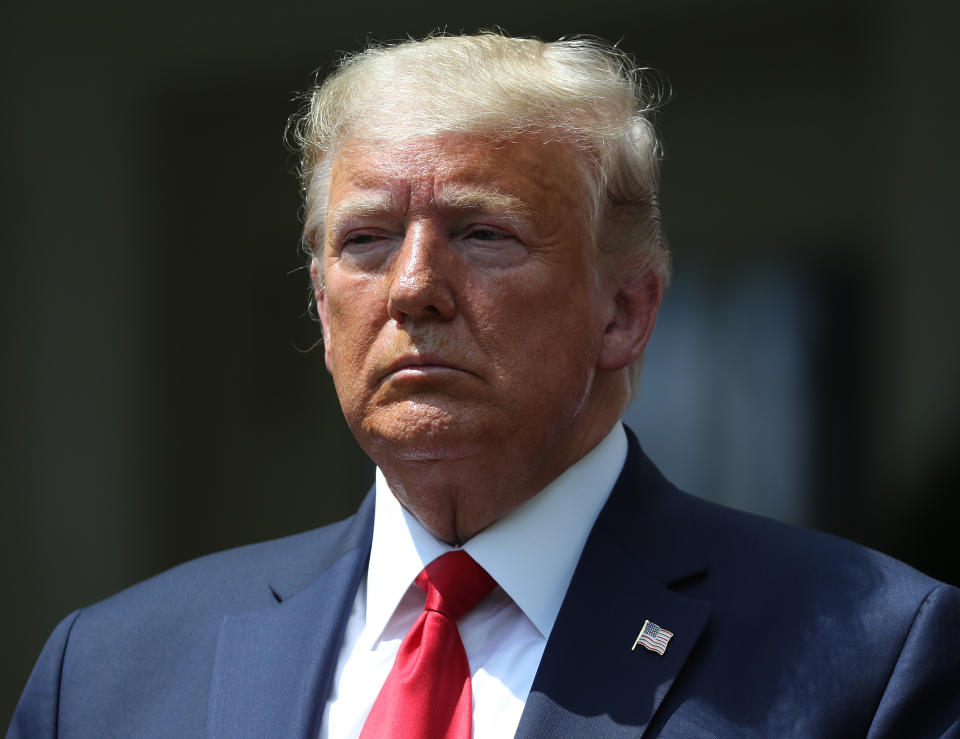Trump says the economy will cure the 'very sad problem' of police killing blacks
Over the past two days, President Trump has twice been asked how he plans to address the systemic racism in U.S. police departments spotlighted by the death of George Floyd in Minneapolis, and both times he has made clear that he believes the solution is a healthy economy.
In a Thursday radio interview with Fox News host Brian Kilmeade, Trump was asked about his reaction to the fact that just 36 percent of African-Americans say they trust local police, compared with 70 percent of whites. “How do you change things?” Kilmeade asked the president.
“Well, I think it’s a very sad problem,” Trump replied. “As you know, as a Republican I’m doing very well with African-Americans and with the vote, with the — in polls and everything — especially, I mean, I haven’t seen one very recently because you had the plague come in from China, so that changed things up, but we had the best economy ever. We had the best numbers for African-American employment and unemployment in history. Best homeownership, best everything. We had the best numbers in everything — not only African-American, but the African-American numbers were great.”
Kilmeade, who is friendly to Trump, briefly pressed the president further. “But how do you handle the law enforcement part of this? How do you handle the law enforcement part of this?”
Trump went off on another tangent in his answer, complaining that he didn’t get enough credit for his remarks about Floyd’s death during an unrelated speech about space exploration. He did not address Kilmeade’s question about systemic changes.
“Well, I think you have to get better than what they’ve been doing. I mean, obviously that was a terrible thing,” Trump replied. “And I’ve spoken about it numerous times in various speeches. And you know, it’s interesting, I spoke about it when we launched a very successful rocket — a tremendous program that culminated on that day and obviously it goes on from there. But I then made a speech and it was a speech about the rocket, and I devoted 25 percent of the speech, probably, to what happened — or more — to what happened with respect to George — George Floyd — and it was ... and then you listen to news, ‘He doesn’t talk about George Floyd.’ The rocket went off, then I made a speech and I talked about George Floyd, but they said he didn’t talk about George Floyd. Half, maybe even almost half of the speech, but a large portion of the speech was devoted exactly to that. And so, you know, with the media you basically — basically no matter what you do, it’s never going to be good enough.”

On Friday — at a White House press conference at which the president touted better-than-expected May job numbers, which he said represented “a great day” for Floyd despite the fact that the figures showed African-American unemployment continued to rise — Trump was asked by PBS reporter Yamiche Alcindor about his plan to address systemic racism.
“Our country is so strong, and that’s what my plan is. We’re going to have the strongest economy in the world. We are almost there now,” he responded.
Trump — who stoked a conspiracy theory that the first African-American president was not born in the United States, went to war with NFL players who during the national anthem protested police killings of African-Americans, and overturned an executive order put in place by Barack Obama forbidding the distribution of military surplus to police departments nationwide — said on Twitter this week that he had “done more for the black community than any president since Abraham Lincoln.”
He is correct that African-American employment was at historic highs before the coronavirus pandemic struck, although those gains began during Obama’s presidency. And while Trump’s signing of the First Step Act was hailed by many African-Americans as an important accomplishment for criminal justice reform, his dismissal of the Obama administration’s plan to address racism in police departments has been sharply criticized.
“I can only assume it’s in keeping with whatever macho image he wants to convey to America, but this was a well-thought-out plan that came from the Obama-Biden administration, and I think to the extent that we’ve had any grace in Atlanta is that we’ve still been following that handbook,” Atlanta Mayor Keisha Lance Bottoms told Yahoo News on Wednesday.
“We’re trying to build and legitimize relationships with our police and our communities long before there’s a problem,” she said. “Having our police recruits volunteer at our youth center, having meaningful engagement and dialogue, having our police officers attend community meetings so that our community can call upon them for the good and the bad — it’s working in Atlanta, and it’s unfortunate that Donald Trump would disregard something that’s working well. That’s not leadership.”
_____
Read more from Yahoo News:



